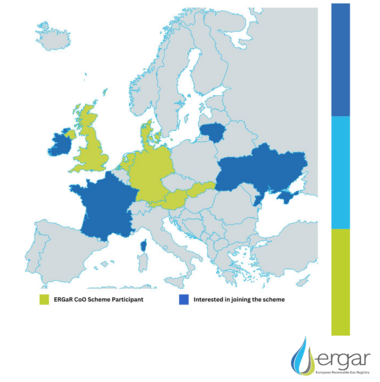The association currently has 40 members from 14 European countries, including established biomethane/renewable gas registries, gas DSOs & TSOs, biogas associations and key players in the European biomethane market.
Renewable gases and biomethane
In order to achieve the European energy and climate goals, it is expected that renewable gases can and will play a key role. Feeding into natural gas grids in particular is expected to be an important driver in the energy transition towards a CO₂-free society.
With more than 500 biomethane plants producing around 17 TWh (source: EBA, 2018, EBA statistical report 2018, data as of end 2017), biomethane is the existing green element of the gas business. More than 17,000 biogas plants in Europe represent a significant potential for biomethane in the near future.
Biomethane is biogas upgraded to natural gas quality. The aim of the cooperation is to create an independent, transparent and trustworthy documentation system for the mass balancing of renewable gas distributed through the European natural gas grid.
The task of the European Renewable Gas Register
ERGaR will be the Europe-wide recognised organisation for the management and bulk balancing of renewable gas volumes distributed virtually along the European gas grid. The organisation brings together the expertise of national renewable gas registries to issue and cancel Guarantees of Origin on a common basis for commodities with export destinations.
Renewable gases in the future
By 2050, renewable gas, such as biomethane, will be produced in thousands of new plants using updated and new technologies from all types of organic waste, by-products and other renewable feedstocks. Renewable gas will provide the green component of the fuel mix with natural gas, which will be distributed through the European gas grid and used in all European countries to generate electricity, for heating and cooling, and as a biofuel in the transport sector.

